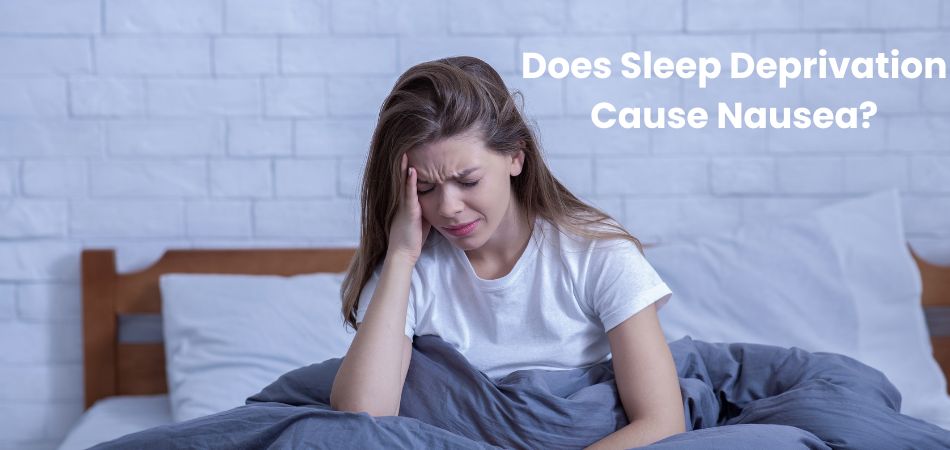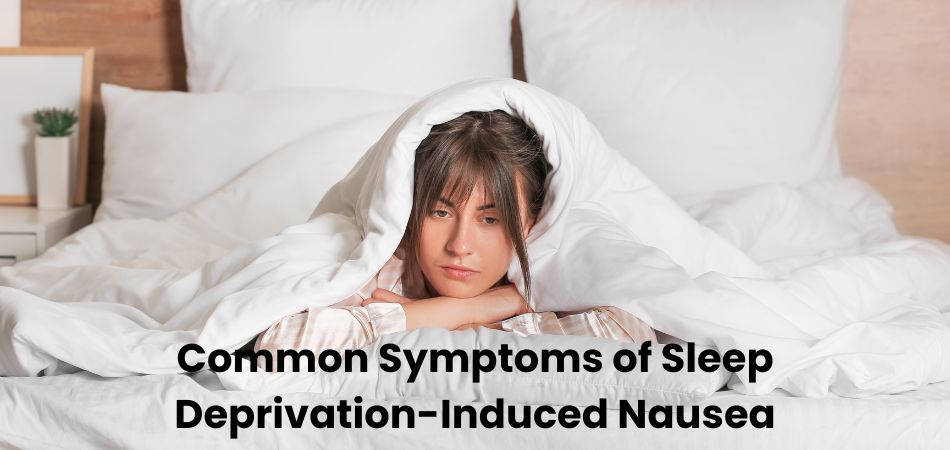Feeling tired and drained after a sleepless night is common, but have you ever noticed an unsettling feeling in your stomach, too? Many people experience digestive discomfort without knowing the connection between poor sleep and physical symptoms. Fatigue often brings more than just mental exhaustion—it can impact your entire body. But does sleep deprivation cause nausea?
Yes, sleep deprivation can cause nausea by disrupting hormone balance, increasing stress, and slowing digestion. These changes can lead to stomach discomfort and queasiness, making quality sleep essential for preventing nausea.
Are you ready to find out how sleep impacts your gut health? Keep reading to learn more and find ways to improve your sleep for better overall well-being.
Does Sleep Deprivation Cause Nausea?
Sleep is essential for maintaining overall health, yet many people underestimate its impact on physical well-being. Beyond fatigue and mental fog, sleep deprivation can trigger physical symptoms, including digestive discomfort. One of the most commonly overlooked effects is nausea, which can disrupt daily activities and lower quality of life.

But does sleep deprivation cause nausea? The answer is yes. A lack of sleep interferes with several bodily systems, including the gut-brain axis, leading to imbalanced hormones and increased stress levels. These disruptions can cause gastrointestinal distress, resulting in feelings of nausea and stomach discomfort.
Knowing how sleep deprivation leads to nausea is crucial for finding relief. By recognizing the underlying causes, individuals can take proactive steps to improve sleep quality and reduce digestive discomfort. Let’s explore some common causes of nausea resulting from sleep deprivation.
Hormonal Imbalances
Sleep deprivation disrupts the balance of hormones that regulate stress and digestion, such as cortisol and ghrelin. Increased cortisol levels heighten stress, leading to stomach discomfort and nausea. Ghrelin imbalance can also affect appetite, making the stomach more sensitive. This hormonal disruption weakens the digestive system’s ability to function properly.
Increased Stress and Anxiety
Lack of sleep amplifies stress and anxiety, both of which are known to trigger nausea. Positive stress hormones can overstimulate the nervous system, leading to stomach cramps and queasiness. Anxiety also slows digestion, causing food to sit longer in the stomach. This combination often results in persistent nausea throughout the day.
Disrupted Gut-Brain Axis
The gut and brain are closely connected through the gut-brain axis. Sleep deprivation impairs this communication, leading to digestive irregularities. This disruption can trigger nausea as the brain struggles to regulate stomach functions. Poor sleep weakens the body’s ability to manage digestion effectively.
Weakened Immune System
Chronic sleep loss can weaken the immune system, making the body more vulnerable to infections. A compromised immune system can lead to inflammation in the stomach and intestines. This inflammation often results in nausea and other digestive issues. A healthy immune response requires adequate rest to function properly.
Dehydration and Electrolyte Imbalance
Sleep deprivation can cause dehydration by disrupting the body’s hydration signals. Dehydration leads to an imbalance in electrolytes, which are essential for normal digestive function. This imbalance can cause dizziness, headaches, and nausea. Staying hydrated is crucial for preventing these uncomfortable symptoms.
Irregular Eating Patterns
Lack of sleep often leads to poor eating habits, such as late-night snacking or skipping meals. Irregular eating disrupts digestion, causing bloating and nausea. Eating heavy or unhealthy foods late at night can worsen this effect. Balanced meal timing supports better digestive health.
Increased Sensitivity to Motion and Light
Sleep deprivation increases sensitivity to environmental triggers like motion and bright lights. This heightened sensitivity can overstimulate the senses and lead to nausea. For example, activities like driving or using screens can feel overwhelming. Adequate rest helps regulate sensory processing and reduces nausea risks.
Common Symptoms of Sleep Deprivation-Induced Nausea
Sleep deprivation affects the body in complex ways, often leading to subtle yet disruptive physical symptoms. Nausea caused by poor sleep can manifest differently for each individual, making it essential to recognize the signs early. Here are some common symptoms to watch for when sleep loss impacts your digestive health.

- Persistent Queasiness: A constant, unsettled feeling in the stomach can occur without any clear reason. This lingering discomfort often worsens as the day progresses.
- Loss of Appetite: Sleep deprivation can dull hunger signals, leading to reduced interest in food. Skipping meals due to nausea can further weaken the body.
- Dizziness and Lightheadedness: Lack of sleep can reduce blood flow to the brain, causing dizziness. This sensation often intensifies when combined with nausea.
- Increased Salivation: Excess saliva production may signal the onset of vomiting. This can make swallowing uncomfortable and contribute to nausea.
- Heightened Sensitivity to Smells: Strong or unfamiliar odors may suddenly trigger nausea. This sensitivity can make it difficult to be in certain environments.
- General Fatigue and Weakness: Extreme tiredness can make the body feel heavy and sluggish. This physical exhaustion often pairs with stomach discomfort, worsening nausea.
When Should You Worry About Nausea from Lack of Sleep?
Occasional nausea from poor sleep may not be alarming, but persistent or severe symptoms can indicate a more serious issue. Recognizing when nausea is more than just a side effect of fatigue is crucial for protecting your health. Below are key signs that it’s time to take action.
Nausea Lasts for Several Days
If nausea persists for more than a few days without improving, it could signal an underlying health problem. Prolonged stomach discomfort might indicate digestive disorders or chronic stress. Continuous symptoms can disrupt daily activities and worsen over time. Seeking medical advice can help identify the root cause.
Accompanied by Severe Headaches or Migraines
When nausea occurs alongside intense headaches or migraines, it may point to neurological issues. Sleep deprivation can trigger migraines, but persistent pain with nausea shouldn’t be ignored. This combination could indicate conditions like sleep apnea or other neurological disorders. Consulting a doctor can provide clarity and proper treatment.
Noticeable Weight Loss or Malnutrition
Unexplained weight loss due to loss of appetite or frequent nausea can be a red flag. Missing meals because of stomach discomfort can lead to nutrient deficiencies. This can weaken the immune system and cause further health complications. Professional help is needed to restore proper nutrition and address the underlying issue.
Nausea Interferes with Daily Activities
If nausea prevents you from working, socializing, or completing daily tasks, it’s a sign to seek help. Sleep-related nausea that affects productivity and mental well-being should not be ignored. Chronic symptoms can impact your quality of life and emotional health. Early medical intervention can help manage and reduce these effects.
When Should You See a Doctor for Sleep-Related Nausea?
Experiencing occasional nausea after a poor night’s sleep is common, but when it becomes frequent or severe, it may signal a more serious issue. If you notice that nausea disrupts your daily routine or becomes a regular occurrence despite improving your sleep habits, it’s time to consider medical advice. Persistent symptoms can indicate underlying health conditions that require professional evaluation.

Additionally, if your nausea is accompanied by other concerning symptoms like chest pain, shortness of breath, or extreme fatigue, seeking immediate medical attention is crucial. These signs could point to more significant health problems unrelated to sleep deprivation. Ignoring these warning signs may delay necessary treatment and worsen your condition.
A healthcare provider can assess your symptoms, identify potential causes, and recommend appropriate treatments. Early intervention can help manage discomfort and prevent long-term health complications. Don’t hesitate to consult a doctor for persistent or severe sleep-related nausea.
Tips to Prevent Nausea by Improving Sleep Habits
Improving sleep quality is essential for maintaining overall health and preventing discomfort like nausea. Simple adjustments to your daily routine can significantly enhance your sleep and reduce digestive issues. Here are practical tips to help you sleep better and minimize nausea.
- Establish a Consistent Sleep Schedule: Going to bed and waking up at the same time every day helps regulate your body’s internal clock. Consistency improves sleep quality and reduces the risk of nighttime discomfort.
- Limit Caffeine and Alcohol Intake: Avoid consuming caffeine or alcohol in the late afternoon and evening, as they can disrupt sleep. These substances can also irritate the stomach, increasing the chance of nausea.
- Create a Relaxing Bedtime Routine: Engage in calming activities like reading or taking a warm bath before bed. Relaxation techniques signal your body that it’s time to rest, promoting deeper sleep.
- Avoid Heavy Meals Before Bed: Eating large or spicy meals late at night can strain digestion and lead to discomfort. Aim to finish eating at least two hours before bedtime.
- Keep Your Sleep Environment Comfortable: Maintain a cool, dark, and quiet bedroom to support restful sleep. A comfortable environment reduces disturbances that can contribute to poor sleep and nausea.
- Stay Physically Active During the Day: Regular exercise helps tire the body naturally, promoting better sleep at night. However, avoid intense workouts close to bedtime, as they may energize you and disrupt rest.
Frequently Asked Questions About Sleep Deprivation and Nausea
Sleep deprivation can lead to a variety of uncomfortable symptoms, and many people are curious about how it specifically causes nausea. Knowing the relationship between poor sleep and digestive discomfort can help you manage and prevent these symptoms. Below are answers to some of the most common questions about this connection.
1. Can Poor Sleep Cause Morning Nausea?
Yes, poor sleep can lead to morning nausea due to hormonal imbalances and increased stress levels overnight. A disrupted sleep cycle may cause the stomach to produce excess acid, leading to discomfort upon waking. Improving sleep quality can help reduce these symptoms.
2. Is It Normal to Feel Nauseous After Pulling an All-nighter?
Feeling nauseous after an all-nighter is common because the body is under extreme physical and mental stress. Lack of rest can slow digestion and cause stomach irritation. Restoring regular sleep patterns can help your body recover.
3. Can Dehydration From Lack of Sleep Cause Nausea?
Yes, sleep deprivation can lead to dehydration, which may trigger nausea. Poor sleep can disrupt the body’s ability to regulate fluids, increasing the risk of dehydration. Staying hydrated throughout the day can help prevent this issue.
4. Does Poor Sleep Affect Digestion?
Poor sleep negatively impacts digestion by slowing down the digestive process and increasing stomach acid production. This can lead to bloating, indigestion, and nausea. Consistent, quality sleep supports healthy digestion.
5. Can Sleep Deprivation Worsen Existing Stomach Conditions?
Yes, lack of sleep can aggravate conditions like acid reflux, gastritis, and irritable bowel syndrome (IBS). Sleep loss increases stress and inflammation, which can intensify digestive symptoms. Managing sleep habits can help reduce flare-ups and discomfort.
Final Words
The connection between sleep and overall health is undeniable, raising the important question: does sleep deprivation cause nausea? The answer is yes—poor sleep can disrupt digestive functions, trigger hormonal imbalances, and increase stress levels, all contributing to nausea.
Recognizing these effects is crucial for addressing discomfort and improving well-being. By prioritizing consistent sleep habits and adopting healthier routines, you can reduce nausea and support your body’s natural balance.
If symptoms persist, seeking medical advice is essential for proper diagnosis and treatment. Prioritizing quality sleep is a crucial step toward better digestive health and overall wellness.
